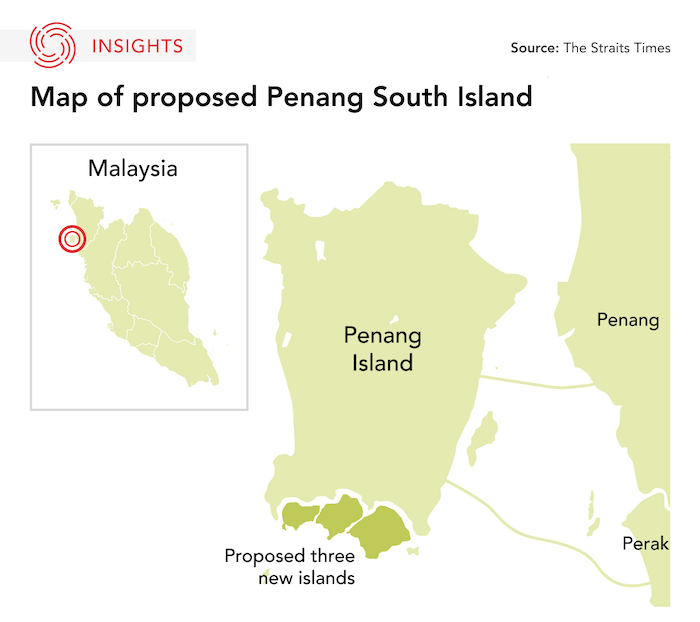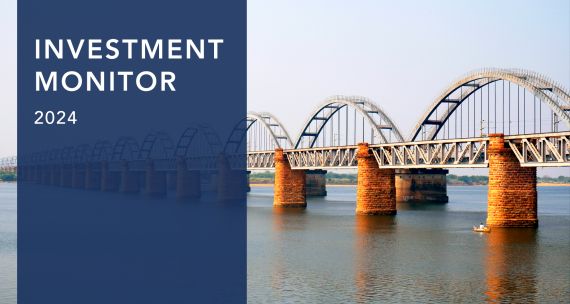The Takeaway
On April 11, Malaysia’s Department of Environment (DOE) approved — with 71 conditions — Penang South Island (PSI), a controversial land reclamation development project led by the state of Penang. Pending the approval of the project’s environment management plan, construction of PSI is expected to begin in the fall of 2023. Despite strong opposition from civil society organizations and environmental NGOs against PSI’s potentially devastating ecological and social impacts, the state government remains steadfast in moving forward with the project.
In Brief
The PSI project will create three artificial islands (islands ‘A,’ ‘B,’ and ‘C’) covering a total reclaimed landmass of 1,620 hectares — an area five times the size of the Toronto Islands in Lake Ontario — along the southern coastline of Penang Island, between Permatang Damar Laut to Gertak Sanggul, strategically located close to the Bayan Lepas Free Industrial Zone.
Construction of Island A, also called ‘Silicon Island’ (the biggest among the three with an area of 930 hectares), is expected to begin in fall 2023. Island A will be developed as a digital tech hub, while Island B will be a business enclave, and Island C will act as a world-class tourism hub.
Revenue from the sale of new land on PSI will be used to recoup the reclamation cost and finance the C$13.8-billion (46 billion Malaysian ringgit) Penang Transport Master Plan (PTMP), a massive public transport infrastructure project approved in 2015 to improve connectivity and ease traffic congestion. Penang Infrastructure Corporation, a specialized agency created by the state government, is managing the PSI and PTMP in collaboration with SRS Consortium, a private builder and developer.

Implications
The state government has promoted PSI as a future engine of Penang’s economic growth and estimates that PSI will contribute around C$662 billion (2.2 trillion Malaysian ringgit) to the country’s GDP over 30 years, in addition to attracting foreign direct investment of up to C$21 billion (70 billion Malaysian ringgit) and creating over 460,000 jobs. The PSI, along with PTMP, is part of Penang’s 2030 vision to transform the state into a smart, green “Silicon Valley of the East.”
Environmental and civil society groups have decried the construction of PSI, fearing irreversible environmental damage to marine life and nearby mangrove ecosystems. The southern coast is the state's richest and most biodiverse fishing area. The loss of fishing grounds could endanger over 6,000 fishers’ livelihoods, deplete nearly 51,184 tonnes of marine catch — worth C$158 million (525 million Malaysian ringgit) per year — and negatively impact 511 aquaculture farms, which collectively yield around 54,742 tonnes of fish, worth C$503 million (1.67 billion Malaysian ringgit) annually. Experts have warned that the proposed project could exacerbate the flooding problem in Penang by eliminating coastal buffers such as mangroves and mudflats.
Opposition groups including Penang Forum, the Consumer Association of Penang, and the Sahabat Alam Malaysia have asked the federal government to cancel the project. They argue that there is no need to create new land when land is available on the Malay peninsula. The groups have also criticized the DOE for conditionally approving the project despite advice from the DOE’s director-general that the project could adversely impact fisheries. But the Democratic Action Party (DAP) governing Penang is pushing ahead regardless and capitalizing on its alliance with Pakatan Harapan (PH), which leads the current federal unity government, to see the project through.
What’s Next
- Possible scaling down or postponement of the project
Land sales from the PSI project were initially intended to help fund the development and construction of Penang's Bayan Lepas LRT line, which is a part of the PTMP. However, Prime Minister Anwar Ibrahim announced on May 6 that the federal government would provide the necessary funds for the LRT line's construction. Chief Minister of Penang Chow Kon Yeow stated that due to this unexpected funding, his government is discussing the possibility of scaling down or postponing the project as there is no longer a need to raise funds for the LRT line.
- Impact on support for PH, DAP in upcoming election
With the Penang State election due to be held on October 1, 2023, opposition to the PSI project is expected to negatively impact the electability of the PH coalition of which Kon Yeow is a member. However, it is very unlikely that PH would lose its supermajority in the Penang State Legislative Assembly as it currently holds 33 out of 40 seats. Furthermore, two seats are held by the Barisan Nasional coalition, which has aligned itself with PH. Meanwhile, Perikatan Nasional, which acts as the state's only opposition, holds one seat in the Penang State Assembly.
• Produced by CAST's Southeast Asia team: Stephanie Lee (Program Manager); Alberto Iskandar (Analyst); Saima Islam (Analyst); and Tim Siao (Analyst).




